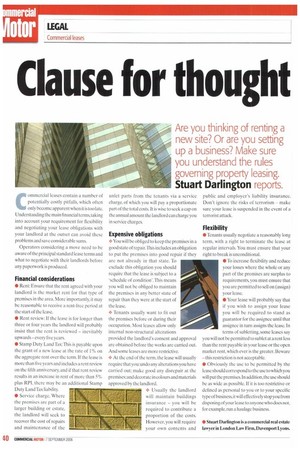Clause for thought
Page 40

If you've noticed an error in this article please click here to report it so we can fix it.
Are you thinking of renting a new site? Or are you setting up a business? Make sure you understand the rules governing property leasing. Stuart Darlington reports.
C' ommercial leases contain a number of potentially costly pitfalls, which often only become apparent when it is too late. Understanding the main financial terms,taking into account your requirement for flexibility and negotiating your lease obligations with your landlord at the outset can avoid these problems and save considerable sums.
Operators considering a move need to be aware of the principal standard lease terms and what to negotiate with their landlords before any paperwork is produced.
Financial considerations
• Rent: Ensure that the rent agreed with your landlord is the market rent for that type of premises in the area. More importantly, it may be reasonable to receive a rent-free period at the start of the lease.
• Rent review: If the lease is for longer than three or four years the landlord will probably insist that the rent is reviewed inevitably upwards-every five years.
• Stamp Duty Land Tax: This is payable upon the grant of a new lease at the rate of 1% on the aggregate rent over the term. If the lease is more than five years and includes a rent review on the fifth anniversary, and if that rent review results in an increase in rent of more than 5% plus RPI, there may be an additional Stamp Duty Land Tax liability.
• Service charge. Where the premises are part of a larger building or estate, the landlord will seek to recover the cost of repairs and maintenance of the unlet parts from the tenants via a service charge. of which you will pay a proportionate part of the total costs. It is wise to seek a cap on the annual amount the landlord can charge you in service charges.
Expensive obligations
• You will be obliged to keep the premises in a good state of repair. This includes an obligation to put the premises into good repair if they are not already in that state. To exclude this obligation you should require that the lease is subject to a 'schedule of condition'. This means you will not he obliged to maintain the premises in any better state of repair than they were at the start of the lease.
Tenants usually want to fit out the premises before or during their occupation. Most leases allow only internal non-structural alterations provided the landlord's consent and approval are obtained before the works are carried out. And some leases are more restrictive.
+ At the end of the term, the lease will usually require that you: undo any alterations you have carried out: make good any disrepair at the premises; and decorate in colours and materials approved by the landlord.
+ Usually the landlord will maintain buildings insurance you will be required to contribute a proportion of the costs. However, you will require your own contents and public and employer's liability insurance. Don't ignore the risks of terrorism make sure your lease is suspended in the event of a terrorist attack.
Flexibility
• Tenants usually negotiate a reasonably long term, with a right to terminate the lease at regular intervals. You must ensure that your right to break is unconditional.
• To increase flexibility and reduce your losses where the whole or any part of the premises are surplus to requirements, you must ensure that you are permitted to sell on (assign) your lease.
• Your lease will probably say that if you wish to assign your lease you will be required to stand as guarantor for the assignee until that assignee in turn assigns the lease. In terms of subletting, some leases say you will not be permitted to sublet at a rent less than the rent payable in your lease or the open market rent, which ever is the greater. Beware this restriction is not acceptable.
• Obviously the use to be permitted by the lease should correspond to the use to which you will put the premises. In addition, the use should be as wide as possible. If it is too restrictive or defined as personal to you or to your specific type of business,it will effectively stop you from disposing of your lease to anyone who does not, for example. run a haulage business.
• Stuart Darlington is a commercial real estate lawyer in London Law Firm, Davenport Lyons.
































































































































































































